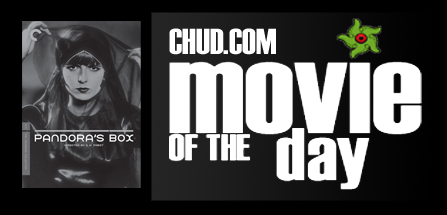The Film: Pandora’s Box (1929)
The Principles: G. W. Pabst (Director). Louise Brooks. Fritz Kortner. Franz Lederer. Carl Goetz. Krafft-Raschig. Alice Roberts.
The Premise: Lulu (Brooks) is a sweet, charming, beautiful young woman. She’s flirty, overtly sexual and naïve enough to be completely oblivious to the fact that all of those things are destroying not only her life but the lives of those around her.
Is It Good: It is! Obviously you have to kind of overlook the more troublesome thematic stuff, as 1929 was a very, very different time and place. But, even if you take the subtext at face value, what’s impressive is that Pabst tells the story and shapes these characters in such a way that it stays subtext and never becomes a sensationalistic propaganda piece.
But that doesn’t mean the intent isn’t there. Lulu barely exists as a character in and of herself (and in the original plays from which this was adapted Lulu my not even be her real name, as everyone she has a relationship with calls her something different, with each name having its own meaning that reduces her to an object or idea instead of a person). She stands as a physical embodiment of femininity and what people at the time saw as everything that’s inherently wrong with that if it’s left unchecked. But for everything terrible that happens as a result of her wanton carelessness, Pabst never goes to any great lengths to vilify her or paint her in a bad light. And what’s fascinating about this is that, while it does indeed seem to serve as a sort of highbrow warning for men (highbrow as opposed to something like this), it seems to be even more concerned with being a warning to women. “Contain your urges, be demure, acquiesce. Because men can’t help themselves so it’s all on you.” And it’s reinforced at the end with the way Lulu meets her fate. And even though in real-world terms the whole “putting all the responsibility on the woman” philosophy is a very real problem that we’re still having to fight today, there’s no denying that – at least in the context of the era – there was warmth and compassion in the way that Pabst looked at his Lulu.
Is It Worth A Look: Definitely. It’s not perfect – it tends to be a little overlong and the plot becomes sort of tedious to follow (though you kind of learn to expect and correct for that when you dive into a silent film) – but there’s no denying the absolutely astonishing amount of chemistry between Louise Brooks and Pabst’s lens. She’s radiant and electrifying and owns every single frame that she’s in. It’s not an exaggeration to say that practically every single iconic female character type – from film noir’s femme fatale all the way down to the Manic Pixie Dream Girl – owes at least something to Louise Brooks and her Lulu.
Random Anecdotes: When Criterion released this (no Blu-ray yet, sadly, but the streaming transfer on Hulu+ looked pretty damn good, so I’m sure the DVD looks even better), they included four different soundtracks: A modern orchestral score; a cabaret score; a minimalist piano score and a more traditional classical score, akin to what you would have heard if you saw the film in its initial run. I’m pretty sure (though not certain) that the modern orchestral score is what was streaming, so if any of you have the disc and wanna fill me in on which version of the soundtrack is better that’d be delightful.
So, yeah, that was more of a random request than a random anecdote.
Cinematc Soulmates: Diary of a Lost Girl. And God Created Woman. Breakfast at Tiffany’s.
